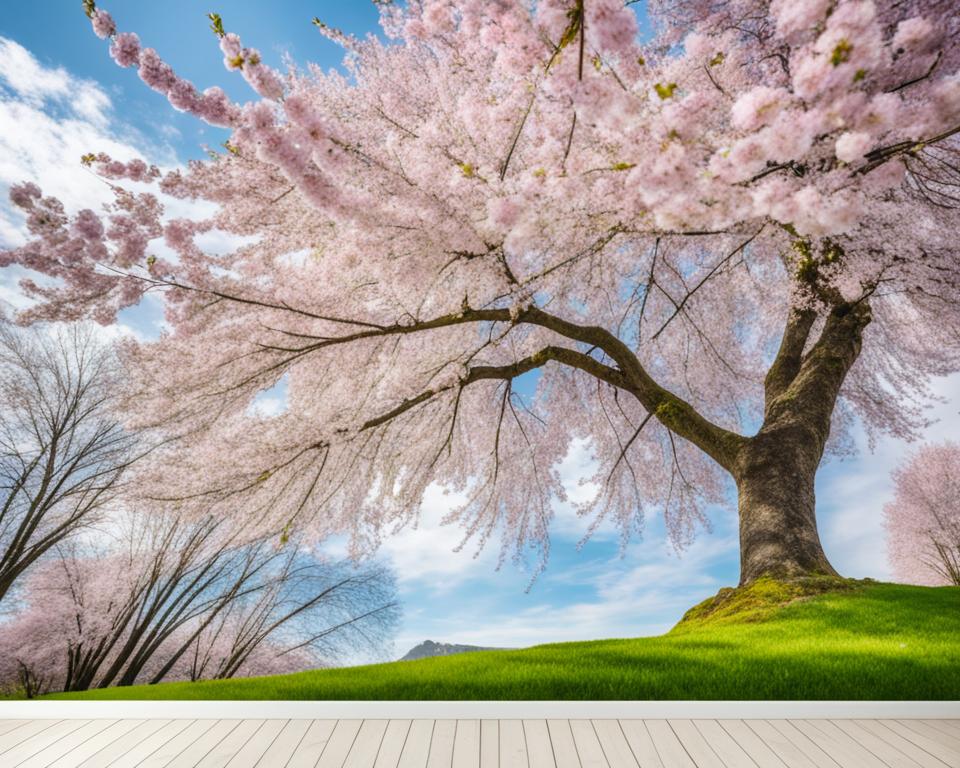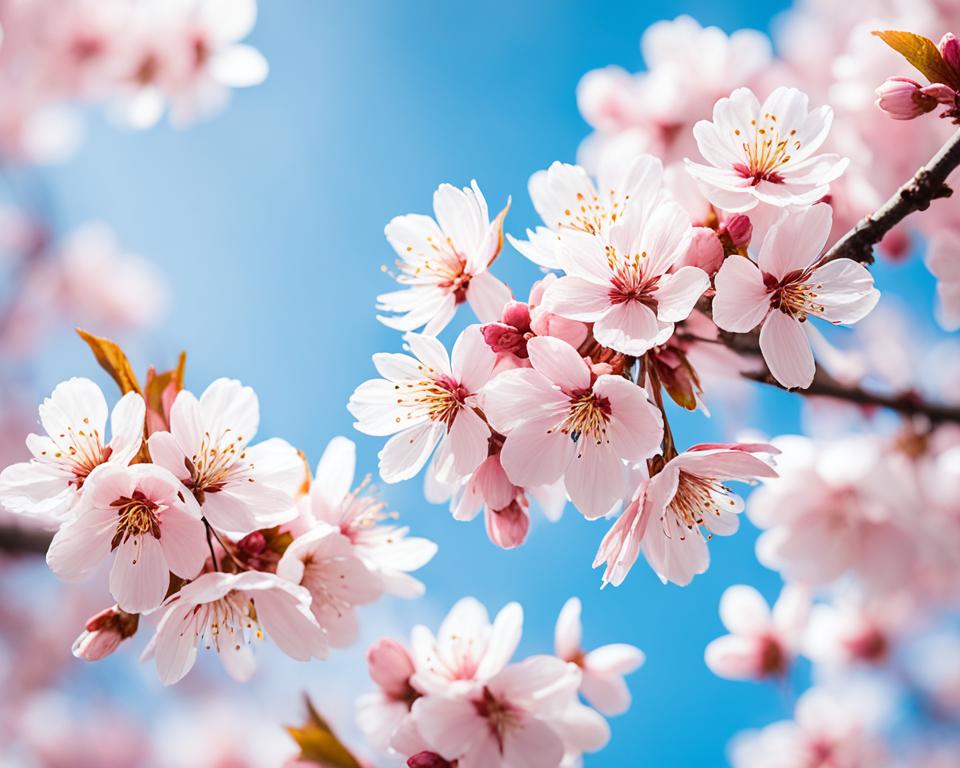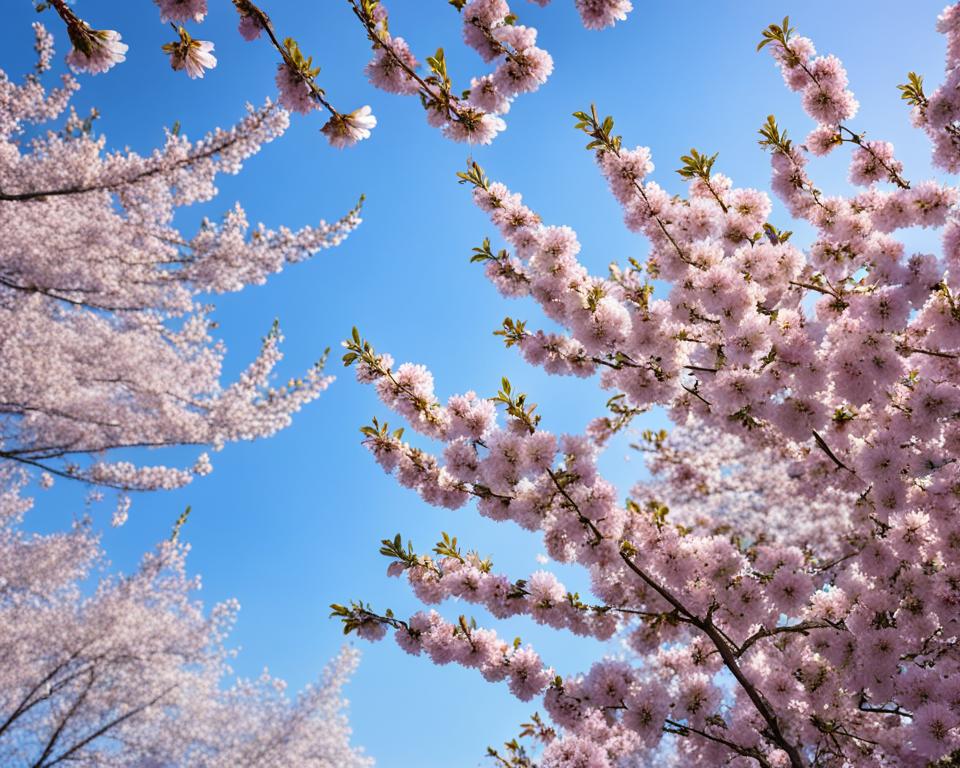Cherry blossoms, known as “sakura” in Japanese, are a true wonder of nature. They bloom every spring, filling the air with color and beauty. This article will take you on a journey to discover their cultural importance, the best places to see them, and their role in local economies and ecosystems.
Read interesting things at : info-kirara
Key Takeaways
- Cherry blossoms, or “sakura,” are one of the most iconic flowers in the world, known for their stunning springtime blooms.
- The cherry blossom is deeply rooted in Japanese culture, with numerous festivals and rituals celebrating their arrival each year.
- Cherry blossom viewing, or “hanami,” is a beloved tradition that attracts millions of visitors to destinations around the world.
- Cherry blossoms have a significant economic impact, driving tourism and supporting local businesses in areas known for their stunning spring displays.
- Conservation efforts are crucial to preserving the natural heritage and cultural significance of these delicate flowers.
The Enchanting World of Cherry Blossoms
The cherry blossom, or sakura, is a symbol of spring that captures hearts worldwide. These delicate flowers are known for their beauty and the magical display they create when they bloom.
Unveiling the Beauty of Sakura
The cherry blossom changes from a bud to a bloom in a mesmerizing way. Starting as tight buds, the sakura flowers open up, showing their soft, pastel petals. As spring goes on, the blossoms grow and fill the air with beauty, creating a stunning view.
From Delicate Buds to Breathtaking Blooms
The cherry blossom shows how short-lived beauty can be. In just weeks, the sakura flowers bloom fully, covering the area in a soft pink. But soon, they start to fall, reminding us of how fast this beauty fades.
The change of the cherry blossom from a small bud to a beautiful bloom is amazing. It leaves a strong impression on everyone who sees it. This beautiful display of nature’s short-lived beauty is a true sign of the spring season.
Exploring the Cultural Significance of Cherry Blossoms
The beauty of japanese flowers, especially the cherry blossoms, is a big part of Japanese culture. These flowers mean more than just their beauty. They carry deep cultural and spiritual meanings.
The hanami festival is at the center of this. It’s a tradition where people come together to enjoy the cherry blossoms. This festival celebrates the short but stunning beauty of the sakura. It brings people together every year.
“The cherry blossom represents the fragility and the beauty of life. It’s a reminder that life is almost overwhelmingly beautiful but also tragically short.”
Cherry blossoms also stand for renewal, the shortness of life, and the beauty of nature. They have inspired many artists and writers. These flowers have become a source of inspiration for those who want to capture their beauty.
Outside of Japan, cherry blossoms mean a lot too. They symbolize hope, strength, and the cycle of life. These japanese flowers touch people all over the world. They have become a symbol of beauty and human experience.
| Cultural Significance of Cherry Blossoms | Symbolic Meaning |
|---|---|
| Hanami Festival | Appreciation of nature’s ephemeral beauty |
| Renewal and Transience | The cycle of life, the fragility of existence |
| Artistic Inspiration | Muse for art, literature, and poetry |
| Global Appeal | Universal symbol of hope and resilience |
The Art of Hanami: Celebrating Cherry Blossom Season
The cherry blossom season in Japan is a magical time. It’s celebrated with the tradition of hanami. This custom has been loved for centuries. People come together to enjoy the beauty of the cherry blossoms.
Traditional Japanese Festivals and Rituals
When the cherry blossoms bloom, Japan is filled with festivals and rituals. The Hanami festival is a key event. People gather under the cherry blossom trees to picnic and enjoy music and dance.
- Lantern festivals, like the Takato Joshi Park Lantern Festival, light up the night with cherry blossoms.
- Tea ceremonies and Kabuki performances add elegance to the celebrations.
- The Hirosaki Cherry Blossom Festival is famous for its beautiful castle garden. It draws visitors from all over to see the cherry blossoms.
These festivals honor the cherry blossoms and remind us to enjoy life’s short moments of joy.
| Festival | Location | Highlights |
|---|---|---|
| Hanami Festival | Throughout Japan | Picnicking under cherry blossom trees, traditional music and dance |
| Takato Joshi Park Lantern Festival | Takato, Nagano Prefecture | Illuminated cherry blossoms, tea ceremonies |
| Hirosaki Cherry Blossom Festival | Hirosaki, Aomori Prefecture | Stunning castle garden setting, Kabuki performances |
Cherry Blossom Hotspots Around the World
The cherry blossoms are famous in Japan, but they bloom in many places around the world. You can find them in South Korea’s lush parks and on Washington, D.C.’s historic streets. These sakura spots are perfect for enjoying the spring bloom.
Iconic Destinations for Sakura Viewing
In Washington, D.C., the Tidal Basin is a top spot for cherry blossoms. It’s surrounded by famous monuments and turns into a beautiful sight of pink sakura blossoms in spring. People come from all over to see this natural wonder.
Seoul, South Korea, has beautiful parks for cherry blossom viewing too. The Yeouido Spring Flower Festival is a big event here. It celebrates the spring bloom with culture and lots of photo chances among the sakura flowers.
| Destination | Unique Experiences |
|---|---|
| Tidal Basin, Washington D.C., USA |
|
| Yeouido Spring Flower Festival, Seoul, South Korea |
|
These cherry blossom spots in the West and East offer a chance to enjoy their beauty and cultural importance. They let travelers dive into the wonder of this short-lived natural event.
Cherry Blossoms and Their Impact on Local Economies
The annual cherry blossom bloom boosts local economies in areas where these flowers draw tourists. During the spring bloom season, visitors come to see the sakura landscapes. This brings a big increase in business for hotels, restaurants, souvenir shops, and tour operators.
Hotels see more guests as people travel to enjoy the cherry blossom beauty. Restaurants and cafes also do well, offering traditional Japanese food and treats inspired by the spring bloom.
But, the cherry blossom season also brings challenges. Too many visitors can cause problems with transportation and the environment. Local authorities work hard to manage the crowds and protect the spring bloom ecosystem.
Despite these issues, cherry blossoms are a big help to many communities. These flowers change local economies for the better. They show how nature can greatly affect our lives and work.
“The cherry blossom is not a common flower – it is something rare. It’s an experience. It’s a celebration of life. It’s a symbol of renewal and hope.”
Cherry Blossom: A Symbol of Renewal and Hope
Cherry blossoms are more than just pretty flowers. They symbolize renewal, the fleeting nature of life, and the importance of living in the moment. These sakura flowers remind us to appreciate life’s brief beauty.
The cherry blossom teaches us to value the short-lived moments in life. When they bloom and then fall, they show us that everything changes. This change is not sad but a celebration of life’s fragility and value.
Cherry blossoms also stand for resilience and hope. After tough times, they remind us that we can bounce back. Their beauty in hard times motivates people to keep going.
“The cherry blossom represents the fragility and the beauty of life. It’s a reminder that life is almost overwhelmingly beautiful but that it is also tragically short.”
– Homaro Cantu, American chef and inventor
The cherry blossom continues to touch hearts worldwide. It teaches us about life’s cycles and the need to enjoy the now. It reminds us to appreciate life, even when things are uncertain.

Preserving Cherry Blossom Heritage
The beauty of cherry blossoms is attracting people from all over the world. It’s vital to protect these natural wonders. Conservation efforts and sustainable practices are being used globally to save cherry blossom trees and their homes.
Conservation Efforts and Sustainable Practices
In places famous for their cherry blossoms, governments, environmental groups, and local people are working together. They’re creating plans to protect the trees and their ecosystems. They also want to make sure the hanami festival is enjoyed in a responsible way.
- Planting and nurturing new cherry blossom trees to replenish aging populations
- Implementing strict regulations to limit development and human impact in sensitive areas
- Educating visitors on the importance of respecting the trees and their surroundings
- Promoting sustainable tourism practices, such as limiting visitor numbers and encouraging eco-friendly transportation
- Collaborating with researchers to better understand the trees’ environmental needs and factors influencing their blooming cycles
These efforts help us enjoy the beauty of cherry blossoms while keeping them safe for the future.
| Conservation Measure | Impact on Cherry Blossom Preservation |
|---|---|
| Planting new saplings | Replenishes aging populations and ensures continued bloom cycles |
| Limiting development in sensitive areas | Protects trees and their habitats from encroachment and disturbance |
| Promoting sustainable tourism | Reduces the ecological footprint of visitors and preserves the natural environment |
| Collaborating with researchers | Enhances understanding of the trees’ needs and supports informed decision-making |
By supporting these conservation efforts, we can keep the cherry blossom tradition alive for future generations.
Capturing the Ephemeral Beauty of Cherry Blossoms
Cherry blossoms have always fascinated photographers, artists, and creative people. They are so delicate and short-lived, making them a challenge to capture. The key is to catch them at the right time and with the right light.
Photographers work hard to snap the blossoms in mid-flutter. Painters try to bring their soft colors to life on canvas. Both capture the beauty of the cherry blossom in their own way. This shows how nature’s short-lived beauty can inspire many creative works.
Cherry blossom art is loved all over the world. Festivals and shows celebrate these beautiful blooms. They show off the vibrant colors and elegant shapes of the blossoms.
When the cherry blossom season comes, artists and photographers can’t wait. They want to capture the spring bloom in all its beauty. Their work reminds us to enjoy the present and see beauty in short moments. The cherry blossom is a lasting source of inspiration for art.
“The cherry blossom is a symbol of the fragility and impermanence of life. Its brief but spectacular bloom reminds us to cherish the present and find beauty in the ephemeral.”
Cherry Blossom-Inspired Art and Literature
The cherry blossom, or sakura, has always inspired artists and authors. These beautiful spring blooms are a big part of many cultures, especially in Asia. They symbolize beauty and short-lived nature.
Artists and poets have celebrated the cherry blossom in many ways. From Japanese ukiyo-e paintings to haiku poetry, it’s been a big theme. Its short life mirrors the brief beauty of our own lives, adding depth to art.
Artistic Expressions of Nature’s Splendor
The cherry blossom has inspired many artists. Famous ones like Hokusai and Hiroshige have shown the beauty of these flowers. Their woodblock prints feature sakura in cities and nature.
In literature, cherry blossom-themed works have also won hearts. Haiku by Matsuo Bashō and stories by Yasunari Kawabata use the blossoms to talk about life’s shortness and beauty. The cherry blossom stands for life’s fragility in stories around the world.

The cherry blossom has made a big impact on art and culture. It inspires artists and writers to show us nature’s beauty. It reminds us to enjoy the beauty around us, even when it’s short-lived.
The Science Behind Cherry Blossom Blooms
The annual bloom of cherry blossoms is a captivating event that draws people from all over the world. But what makes these flowers bloom in the spring is truly fascinating. From the weather to how they get pollinated, the journey from bud to bloom shows how complex nature is.
Temperature is a big factor in when cherry blossoms bloom. They like the temperature to be between 50 and 80 degrees Fahrenheit. If it’s too cold early in spring, they might bloom late. But if it gets too warm, they might bloom sooner. Watching the weather closely helps experts guess when the blossoms will be in full bloom.
Pollination is key to the life of cherry blossoms. Bees, butterflies, and even birds help pollinate them, which is important for making fruit. Scientists are studying how these pollinators and the blossoms work together. They want to learn more about their relationship in nature.
| Environmental Factor | Impact on Cherry Blossom Blooms |
|---|---|
| Temperature | Optimal range between 50-80°F; cooler weather delays, warmer weather accelerates blooms |
| Precipitation | Moderate rainfall supports healthy bud development and flowering |
| Pollinators | Bees, butterflies, and birds facilitate fertilization and fruit production |
Climate change is changing how cherry blossoms bloom. Researchers are looking into how this affects them. They’re studying how the blossoms adapt, how pollinators change, and how it impacts the environment. By understanding this, we can try to keep the beautiful spring blooms for the future.
“The cherry blossom tree is traditionally known for its delicate and transient nature. It represents the fragility and impermanence of human life and is a reminder to make the most of every moment.”
Cherry Blossom Trivia and Fun Facts
The cherry blossoms, or sakura in Japan, are more than just beautiful flowers. They are full of interesting facts and cultural importance. These Japanese flowers are a mix of beauty and science.
- Did you know that the cherry blossom is Japan’s national flower? It’s a symbol of Japan’s rich culture and has been loved for centuries.
- The sakura flowers are famous for their short beauty. They bloom for only 1-2 weeks before they fall, creating a stunning view.
- The first cherry blossom festival, called Hanami, started in the 8th century. This shows how deep this tradition goes.
- In Japan, the cherry blossom reminds people of mono no aware. This means understanding the shortness of life.
Cherry blossoms are not just culturally important. They also have scientific facts. For example, their blooming depends on the weather. They bloom earlier in warm years and later in cool ones. This makes them a way to see how climate change affects nature.
If you love cherry blossoms or are just starting to, these facts will make you appreciate them more. They show the beauty and history behind these Japanese flowers.
Conclusion
As we say goodbye to the magical world of cherry blossoms, we see their timeless beauty. These flowers touch hearts across the globe. They turn landscapes into dreamlike scenes and are part of ancient traditions.
They symbolize new beginnings, beauty, and life’s shortness. We’ve looked at their cultural importance, economic role, and their value to the environment. We’ve seen how hard people work to keep these flowers for the future.
We’ve learned about the spring bloom and the hanami festivals. Now, we invite you to see the cherry blossom magic for yourself. You can join festivals, go on tours, or travel alone to experience it.
By doing so, you’ll grow to love nature more. You’ll see how these flowers touch our culture and the planet in big ways.
